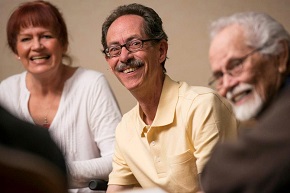Faces of COPD: John Linnell says '...It's Just a New Chapter'
Posted on November 08, 2017 |
As State Captain for Wisconsin and a Stage 4 COPD patient, John tries to stay abreast of current issues, legislation and involvement with other patients.
Initial Diagnosis
John was diagnosed with COPD at age 50. He had been a moderate smoker since college. Feeling fatigued, John mentioned this to his doctor, expecting him to tell him this was just part of getting old. Instead, the doctor said he suspected COPD and referred John to a pulmonary specialist who confirmed the diagnosis of moderate COPD.
 “When I was initially diagnosed, my COPD didn't really prevent me from work or keep me from my normal routine. This was possibly a two-edged sword, as I didn’t change my daily behavior as I now know I should have. Having an acquaintance that also had COPD was a big help as well as family and friends. I was fortunate that no one tried to ‘blame’ me for causing my COPD as a smoker.”
“When I was initially diagnosed, my COPD didn't really prevent me from work or keep me from my normal routine. This was possibly a two-edged sword, as I didn’t change my daily behavior as I now know I should have. Having an acquaintance that also had COPD was a big help as well as family and friends. I was fortunate that no one tried to ‘blame’ me for causing my COPD as a smoker.”
Faced with this new diagnosis, John had to “basically discover on my own how to find others with COPD to talk to, how to find assistance in obtaining my medications and medical care and how to establish a good diet and exercise regimen to help slow the progression of my COPD.”
Getting Involved
Through support groups, John could now “sit at the table” with his peers and both give and receive support. He also became involved in a couple of clinical trials, leading to a greater appreciation for research in the pulmonary field. His pulmonologist, Dr. Roberto Benzo, at the Mayo Clinic “gave me the confidence to continue becoming involved in research as a patient. I’m now a co-investigator for a COPD research study at Johns Hopkins and have done some work on other research projects as well.”
John learned about the COPD Foundation (COPDF) through his first advocacy assignment, an educational film. Karen Deitemeyer, COPD State Captain, Florida, and Edna Shattuck, COPDF Board Member, were also participants. “Karen told me about COPDF and the rest is history.” Eventually, John became a Captain for his state of Wisconsin.
As a State Captain, John lobbied on Capitol Hill in 2014 with the Foundation (COPDF) in Washington, D.C., to meet with the offices of many members of Congress urging “Yay” votes on legislation favoring COPD Medicare reimbursements. He was able to get appointments with the offices of 4 Congressmen and with both of his Senators offices . He is most proud to have “attended and actively participated in the Town Hall at the National Institutes of Health headquarters to help put together the long awaited National Action Plan for COPD. Each year, he also sits as a full voting Patient Reviewer for research grant applications for the Congressionally Directed Medical Research Program's peer review. and is on the Board of Directors for the US COPD Coalition and also for EFFORTS, an international patient support group.
Reaching Individuals with COPD
 John considers himself one of the lucky ones, staying out of the hospital and having a good grasp on what to watch for. “I am fortunate that, even at Stage 4, I have not had an exacerbation that has landed me in the hospital. I am absolutely convinced that through better educating COPD patients (I actually refer to us as COPDers) exacerbations can be reduced, hospital admissions and readmissions can be reduced and overall quality of life improved. Even something as seemingly easy as using daily inhalers is something that I would guess most individuals with COPD do not do completely correctly.”
John considers himself one of the lucky ones, staying out of the hospital and having a good grasp on what to watch for. “I am fortunate that, even at Stage 4, I have not had an exacerbation that has landed me in the hospital. I am absolutely convinced that through better educating COPD patients (I actually refer to us as COPDers) exacerbations can be reduced, hospital admissions and readmissions can be reduced and overall quality of life improved. Even something as seemingly easy as using daily inhalers is something that I would guess most individuals with COPD do not do completely correctly.”
This is because there is “far too little known about living with COPD. 50% of those with COPD do not even know they have it. Then, when diagnosed, many do not know where to turn for help to afford their medications, to decide whether they are able to continue working, to find affordable care and support among other COPD patients. Patients simply do not receive enough information initially and then not enough follow-up or ongoing education and support.”
John firmly believes “we can do a better job of educating the public on the warning signs for COPD and educate the patient on how to increase their Quality of Life living with COPD. Teach and train the patients, then perhaps involve them with other patients. Patients listen to patients!” John’s Advice to Others For anyone interested in helping people with COPD: “Resources are desperately needed. Specifically, money is needed for funding research, for education, for awareness and to revisit Medicare allowances for those on supplemental O2.”
For friends, family and caregivers of those who live with COPD: “Please understand that we individuals with COPD aren't lazy or trying to get a ‘free ride’. We do what we can and sometimes more than we feel we can. Educate yourself and help your COPDer become more educated. Unfortunately, some individuals with COPD don't fully realize the benefits of pulmonary rehabilitation and staying active daily.”
And, finally, for someone newly diagnosed with COPD: “Take off your shoes and socks and carefully examine the bottoms of your feet. You won't find an expiration date! Learn about COPD. Become a ‘partner in care’ with your physician. Keep moving…exercise is key. Take ownership of your COPD. It's yours, so keep a positive mental attitude and keep living your life. It's not the end, it's just a new chapter.”
Connect with Us
Join the network of leaders taking small steps towards greater COPD awareness nationwide. The COPD State Captain program is open to anyone who wants to take any action, big or small, to inform their communities about COPD.